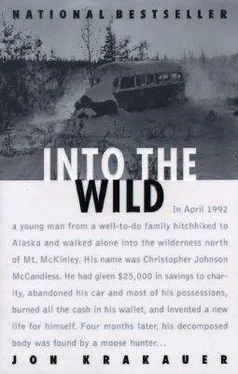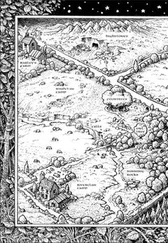Despite the missing windows, the air inside the cavernous vehicle is stale and musty. “Wow,” Roman remarks. “It smells like dead birds in here.” A moment later I come across the source of the odor: a plastic garbage bag filled with feathers, down, and the severed wings of several birds. It appears that McCandless was saving them to insulate his clothing or perhaps to make a feather pillow.
Toward the front of the bus, McCandless’s pots and dishes are stacked on a makeshift plywood table beside a kerosene lamp. A long leather scabbard is expertly tooled with the initials R. E: the sheath for the machete Ronald Franz gave McCandless when he left Salton City.
The boy’s blue toothbrush rests next to a half-empty tube of Colgate, a packet of dental floss, and the gold molar crown that, according to his journal, fell off his tooth three weeks into his sojourn. A few inches away sits a skull the size of a watermelon, thick ivory fangs jutting from its bleached maxillae. It is a bear skull, the remains of a grizzly shot by someone who visited the bus years before McCandless’s tenure. A message scratched in Chris’s tidy hand brackets a cranial bullet hole: all hail the phantom BEAR, THE BEAST WITHIN US ALL. ALEXANDER SUPERTRAMP. MAY 1992.
Looking up, I notice that the sheet-metal walls of the vehicle are covered with graffiti left by numerous visitors over the years. Roman points out a message he wrote when he stayed in the bus four years ago, during a traverse of the Alaska Range: noodle eaters en route to lake clark 8/89. Like Roman, most people scrawled little more than their names and a date. The longest, most eloquent graffito is one of several inscribed by McCandless, the proclamation of joy that begins with a nod to his favorite Roger Miller song: two years he walks the earth. no phone, no POOL, NO PETS, NO CIGARETTES. ULTIMATE FREEDOM. AN EXTREMIST. AN AESTHETIC VOYAGER WHOSE HOME IS THE ROAD…
Immediately below this manifesto squats the stove, fabricated from a rusty oil drum. A twelve-foot section of a spruce trunk is jammed into its open doorway, and across the log are draped two pairs of torn Levi’s, laid out as if to dry. One pair of jeans-waist thirty, inseam thirty-two-is patched crudely with silver duct tape; the other pair has been repaired more carefully, with scraps from a faded bedspread stitched over gaping holes in the knees and seat. This latter pair also sports a belt fashioned from a strip of blanket. McCandless, it occurs to me, must have been forced to make the belt after growing so thin that his pants wouldn’t stay up without it.
Sitting down on a steel cot across from the stove to mull over this eerie tableau, I encounter evidence of McCandless’s presence wherever my vision rests. Here are his toenail clippers, over there his green nylon tent spread over a missing window in the front door. His Kmart hiking boots are arranged neatly beneath the stove, as though he’d soon be returning to lace them up and hit the trail. I feel uncomfortable, as if I were intruding, a voyeur who has slipped into McCandless’s bedroom while he is momentarily away. Suddenly queasy, I stumble out of the bus to walk along the river and breathe some fresh air.
An hour later we build a fire outside in the fading light. The rain squalls, now past, have rinsed the haze from the atmosphere, and distant, backlit hills stand out in crisp detail. A stripe of incandescent sky burns beneath the cloud base on the northwestern horizon. Roman unwraps some steaks from a moose he shot in the Alaska Range last September and lays them across the fire on a blackened grill, the grill McCandless used for broiling his game. Moose fat pops and sizzles into the coals. Eating the gristly meat with our fingers, we slap at mosquitoes and talk about this peculiar person whom none of us ever met, trying to get a handle on how he came to grief, trying to understand why some people seem to despise him so intensely for having died here.
By design McCandless came into the country with insufficient provisions, and he lacked certain pieces of equipment deemed essential by many Alaskans: a large-caliber rifle, map and compass, an ax. This has been regarded as evidence not just of stupidity but of the even greater sin of arrogance. Some critics have even drawn parallels between McCandless and the Arctic’s most infamous tragic figure, Sir John Franklin, a nineteenth-century British naval officer whose smugness and hauteur contributed to some 140 deaths, including his own.
In 1819, the Admiralty assigned Franklin to lead an expedition into the wilderness of northwestern Canada. Two years out of England, winter overtook his small party as they plodded across an expanse of tundra so vast and empty that they christened it the Barrens, the name by which it is still known. Their food ran out. Game was scarce, forcing Franklin and his men to subsist on lichens scraped from boulders, singed deer hide, scavenged animal bones, their own boot leather, and finally one another’s flesh. Before the ordeal was over, at least two men had been murdered and eaten, the suspected murderer had been summarily executed, and eight others were dead from sickness and starvation. Franklin was himself within a day or two of expiring when he and the other survivors were rescued by a band of metis.
An affable Victorian gentleman, Franklin was said to be a good-natured bumbler, dogged and clueless, with the naive ideals of a child and a disdain for acquiring backcountry skills. He had been woefully unprepared to lead an Arctic expedition, and upon returning to England, he was known as the Man Who Ate His Shoes-yet the sobriquet was uttered more often with awe than with ridicule. He was hailed as a national hero, promoted to the rank of captain by the Admiralty, paid handsomely to write an account of his ordeal, and, in 1825, given command of a second Arctic expedition.
That trip was relatively uneventful, but in 1845, hoping finally to discover the fabled Northwest Passage, Franklin made the mistake of returning to the Arctic for a third time. He and the 128 men under his command were never heard from again. Evidence unearthed by the forty-odd expeditions sent to search for them eventually established that all had perished, the victims of scurvy, starvation, and unspeakable suffering.
When McCandless turned up dead, he was likened to Franklin not simply because both men starved but also because both were perceived to have lacked a requisite humility; both were thought to have possessed insufficient respect for the land. A century after Franklin’s death, the eminent explorer Vilhjalmur Stefansson pointed out that the English explorer had never taken the trouble to learn the survival skills practiced by the Indians and the Eskimos-peoples who had managed to flourish “for generations, bringing up their children and taking care of their aged” in the same harsh country that killed Franklin. (Stefansson conveniently neglected to mention that many, many Indians and Eskimos have starved in the northern latitudes, as well.)
McCandless’s arrogance was not of the same strain as Franklin’s, however. Franklin regarded nature as an antagonist that would inevitably submit to force, good breeding, and Victorian discipline. Instead of living in concert with the land, instead of relying on the country for sustenance as the natives did, he attempted to insulate himself from the northern environment with ill-suited military tools and traditions. McCandless, on the other hand, went too far in the opposite direction. He tried to live entirely off the country-and he tried to do it without bothering to master beforehand the full repertoire of crucial skills.
It probably misses the point, though, to castigate McCandless for being ill prepared. He was green, and he overestimated his resilience, but he was sufficiently skilled to last for sixteen weeks on little more than his wits and ten pounds of rice. And he was fully aware when he entered the bush that he had given himself a perilously slim margin for error. He knew precisely what was at stake.
Читать дальше












